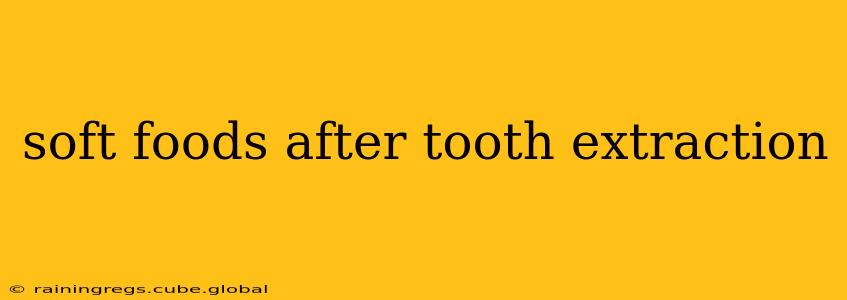Having a tooth extracted can be a bit uncomfortable, and what you eat in the days following the procedure is crucial for a smooth recovery. This guide explores the best soft foods to eat after a tooth extraction, addressing common concerns and providing practical advice to ensure your healing process is as comfortable as possible. We'll also delve into what to avoid and answer frequently asked questions surrounding your diet after this oral surgery.
What are the best soft foods to eat after a tooth extraction?
The key is to choose foods that are easy to chew and swallow, requiring minimal jaw movement. Think creamy, smooth textures that won't irritate the extraction site. Here are some excellent options:
- Yogurt: A protein-packed and cooling choice, especially if you opt for Greek yogurt for added protein. Plain yogurt is best to avoid added sugars.
- Smoothies: Blend fruits, vegetables, and even protein powder for a nutritious and easy-to-consume meal replacement. Avoid using a straw initially to prevent suction.
- Applesauce: Unsweetened applesauce provides essential vitamins and minerals without causing any strain on the healing socket.
- Mashed potatoes: A classic comfort food, mashed potatoes are gentle on the gums and provide carbohydrates for energy.
- Scrambled eggs: A great source of protein, scrambled eggs should be soft and easily mashed with a fork.
- Oatmeal: A warm and comforting breakfast option, oatmeal is easy to swallow and provides fiber. Choose varieties without hard nuts or seeds.
- Soups (broth-based): Avoid soups with chunky vegetables or hard noodles initially. Opt for pureed or strained soups.
- Pudding: A simple dessert that's easy to consume and offers some nutritional value.
- Protein shakes: Provide essential nutrients and easy calories without excessive chewing.
What foods should I avoid after tooth extraction?
It's just as important to know what to avoid as what to eat. Certain foods can interfere with healing and increase the risk of complications:
- Anything that requires excessive chewing: This includes tough meats, crunchy vegetables, and hard candies.
- Foods with small seeds or bits: These can easily lodge themselves in the extraction socket, causing infection or irritation.
- Spicy foods: These can irritate the sensitive extraction site and increase discomfort.
- Extremely hot or cold foods: Temperature extremes can exacerbate pain and sensitivity.
- Foods that require forceful sucking: This includes straws and thick milkshakes, which can dislodge the blood clot crucial for healing.
- Alcohol and smoking: Both can hinder the healing process and increase the risk of complications.
How long should I eat soft foods after tooth extraction?
The length of time you'll need to stick to a soft food diet depends on the complexity of the extraction and your individual healing process. Typically, you should aim for at least a week, gradually reintroducing more solid foods as your mouth feels comfortable. Your dentist or oral surgeon will provide specific instructions tailored to your situation.
What if I'm having trouble eating?
If you're struggling to consume enough calories or nutrients due to pain or discomfort, don't hesitate to contact your dentist or oral surgeon. They may recommend nutritional supplements or provide additional advice on managing your diet.
Can I eat solid foods right away after tooth extraction?
No, it's strongly advised to avoid solid foods immediately after a tooth extraction to allow the extraction site to begin the healing process. Sticking to a soft food diet initially will significantly reduce your discomfort and increase the chances of successful healing.
What are the consequences of not following a soft food diet after tooth extraction?
Ignoring the advice to eat soft foods can lead to several problems, including:
- Dry socket: A painful condition caused by the dislodgement of the blood clot that protects the extraction site.
- Infection: Food particles can become lodged in the socket, increasing the risk of infection.
- Delayed healing: Chewing solid foods can disrupt the healing process and prolong recovery.
- Increased pain and discomfort: The extraction site is already sensitive, and solid foods can exacerbate the pain.
By adhering to a soft food diet in the days following a tooth extraction, you can significantly improve your comfort and ensure a swift and successful recovery. Remember to consult your dentist or oral surgeon for personalized recommendations and to address any concerns you may have.
